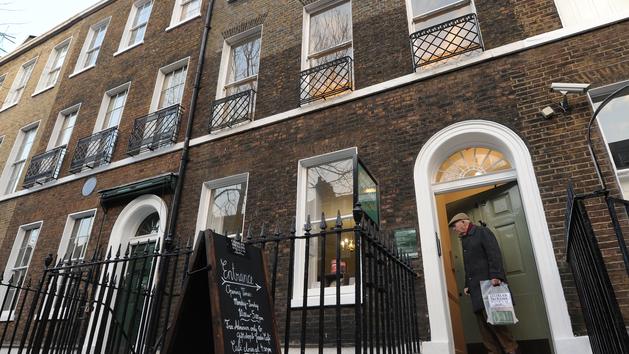Attendance in free fall, reduced opening days, laminated income ... Like the picturesque Charles-Dickens Museum in London, British cultural institutions are financially strangled by the pandemic.
No visitor wanders at the start of the week among the woodwork of the Victorian house where the famous author of
Oliver Twist
lived in the 19th century
, in the center of the British capital.
For good reason, the house housing many personal effects of the writer, who had a very fruitful period there, has been closed four days a week since his release from confinement at the end of July.
Read also: Charles Dickens, the writer of the oppressed
"
When we had to close our doors in March, we suddenly lost 98% of our income
", the revenues of the small independent museum coming from the ticket office and the sales of souvenirs, explains to AFP its director, Cindy Sughrue.
“
Without warning, we had to see how we were going to survive,
” she explains.
This question remains relevant today, with an attendance, in normal times of 60,000 annual visits, divided by five.
Quarantine for foreign travelers, gatherings between different homes banned indoors in London ... The 50% of foreign visitors have deserted and the British are being cautious, their country counting nearly 44,000 dead, more than elsewhere in Europe.
It's a bit like a roller coaster
Cindy Sughrue, Director of the Charles-Dickens Museum
“
Every time there is a new government announcement or new restrictions, our numbers go down before gradually rising.
It's a bit like a roller coaster,
”says Cindy Sughrue.
Bloodless institutions
The impact is all the more violent as this establishment intended to mark the 150th anniversary of the death of Charles Dickens this year.
Like him, museums, theaters and concert halls, from the most confidential to world-famous institutions, have been left bloodless by the new coronavirus, with the loss of hundreds of jobs as a result.
Some have not reopened, discouraged by health constraints.
In an emergency, the government released aid of 1.57 billion pounds, or 1.72 billion euros.
But there are many in the cultural sector to deplore a plaster on a wooden leg.
I'm absolutely certain we'll bounce back when the pandemic is over and international tourism returns, but it's unclear when that will happen.
Cindy Sughrue, Director of the Charles-Dickens Museum
The Charles-Dickens Museum has received around 500,000 pounds in various aids - for an annual turnover of 850,000 pounds - which will allow it to last until spring.
"
I am absolutely certain that we will bounce back when the pandemic is over and international tourism returns, but we do not know when that will happen,
" said Cindy Sughrue, who wonders if it will really be possible to resist until then.
Hockney on sale
Faced with "
the greatest crisis
" in its history, with revenues halved, the Royal Opera House in London has made a radical decision: it is auctioning on Thursday a portrait of its former director David Webster by the famous British painter David Hockney.
The sale is expected to generate between 11 and 18 million pounds, or 12 to 20 million euros, according to the newspaper
The Observer
.
To read also: The eternal spring of David Hockney
Sell works of art to stay afloat, as the New York Museum in Brooklyn recently dared?
This very long taboo question was also invited to the Royal Academy of Arts, where some employees are asking that a sculpture by Michelangelo be sold to save 150 jobs, or about half of the workforce.
“
Selling a work of art or a piece from a museum's collection is the last thing an institution wants to do,
” explains Cindy Sughrue, stressing that her establishment would only take the leap as a last resort.
Read also: British Airways will sell its works of art to replenish its cash flow
In a parliamentary report published in July, museum associations warned against the sale of collector's items, in the event of bankruptcy, which "
would undo decades of hard work to develop
" these institutions and would result in "
loss, potentially irrecoverable, from public access to most of our national heritage
”.
While waiting for better days, Cindy Sughrue tries to see the glass half full: the coronavirus crisis has also made it possible to develop new online content, accessible to a much larger audience - if not very profitable.
"
One of the greatest benefits of this pandemic is that it also challenges us to think differently
."

